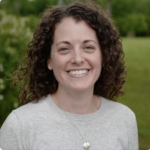Charting Your Path: Students Leverage Learning Pathways to Prepare for A Globally Networked Future
High school is a time of exploration in so many ways. Students are searching for who they are socially and emotionally, and they’re navigating their academic journey at the same time. They may be pursuing a variety of interests and contemplating that moment in the not-so-distant future when they will have to make decisions on their college major or career path. GOA is committed to helping students both deepen their growing interests and investigate topics that have sparked their curiosity by extending learning pathways and experiences that position them to make informed decisions when the time comes. One year ago, we created our Learning Pathways and Global Learning Certification programs to allow students to chart their own path and tell their story as they embark on the college admissions process and career planning. These programs are designed to empower students to take control of their learning and prepare for their future. The eight learning pathways are: Art, Media & Design; Business, Economics & Finance; Computer Science & Engineering; Global Studies; Health Science; Justice, Ethics & Human Rights; Mathematics & Quantitative Reasoning; and Psychology & Neuroscience.
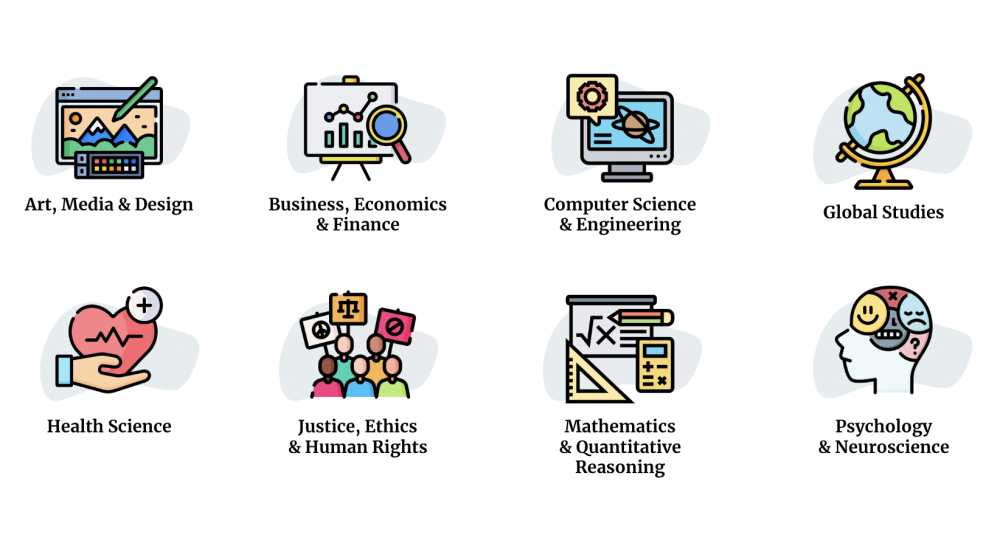
New Learning Pathways
For students like Amelie at The John Cooper School in The Woodlands, Texas, GOA’s Learning Pathways program has created an avenue for her to explore her passion in greater depth. By taking CSI: Computational Thinking, CSII: Java, and CSII: Analyzing Data with Python, Amelie has developed a range of practical, transferable skills in the field of Computer Science and transdisciplinary skills through her mastery of GOA's Core Competencies. She shares, “I think being able to work with people in different areas than yourself was such a great skill to learn. I work with students across Texas and the US through Junior State of America, and you can think of our initiatives as similar to the projects done in these online classes. You have to work together with the barrier of a screen as well as manage your time well to meet the deadline.”
Similar to Amelie, students in the 2024 graduating class are using GOA courses to drive their own academic journey. While the class of 2018 had about 80% of GOA students who took just one GOA semester course, the percentage of students taking two or more GOA classes has grown steadily.
By the end of the 2023-2024 academic year, we anticipate that the majority of GOA students will be taking at least two GOA courses. For Amelie, her GOA summer course selections allowed her more flexibility during the academic year and helped her acquire and apply critical skills in her area of interest. She explains, “My first two [GOA courses] allowed me to take both [of the on-campus] classes I wanted during my sophomore year. I was able to take Speech and Debate in the Fall, Law and Legal Philosophy in the Spring [on campus], and CS I and II in the summers before and after 10th grade [through GOA]. I took the data analysis with python course as a way to apply my CS skills.”
There are two key factors empowering students to chart their course through more than one GOA class. First, like Amelie, more and more students are using our growing summer program to test the waters. Second, we are noting an ongoing trend of a younger GOA student body (which is related to the growing summer program). While in 2018-2019 26% of our summer student body was going into 9th or 10th grade, in 2022-2023 that number was 47%.
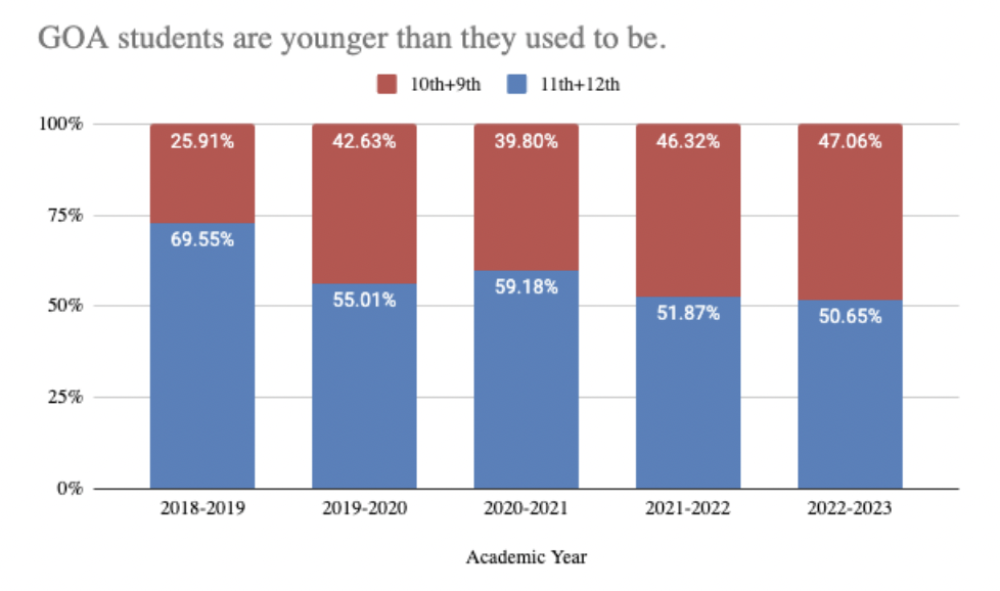
More students are taking GOA courses in the 9th and 10th grade during the summer.
Amelie is one of several students who have chosen to extend their learning in GOA’s Computer Science & Engineering pathway and that, along with Business & Economics, has been one of our fastest growing learning pathways. Among students in the class of 2018, 4% of GOA’s enrollments were in Computer Science & Engineering, whereas with the class of 2024, that number has grown to 10%. Similarly, Business, Economics & Finance enrollments have grown from 7% of our total enrollments in 2018 to 18% in this current graduating class.
Students who complete three classes in a particular pathway earn a Pathway Certification that lists the courses they’ve taken and the competencies mastered in those courses. Students exploring courses regardless of the pathway earn a Global Learning Certificate through GOA.
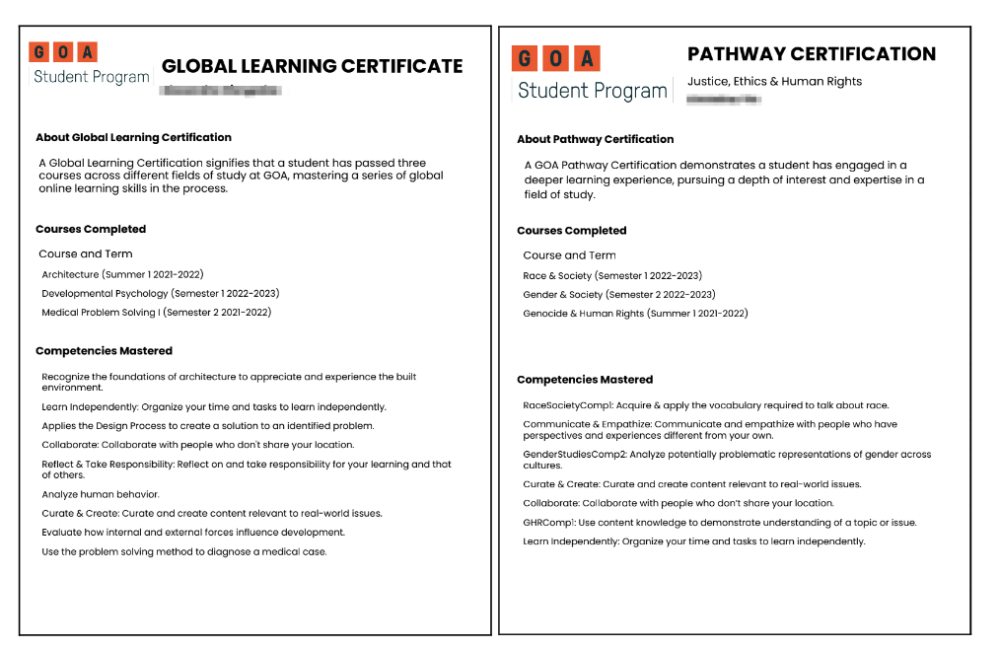
Global Learning Certifications
While our Learning Pathways program helps students double down in a passion area, we are mindful that early academic specialization isn’t for everyone. Exploring a variety of courses in different subject areas is an equally beneficial way to determine your future plans. For Zosia, an 11th grade student at American School of Warsaw, the chance to take Medical Problem Solving, Introduction to Legal Thinking, International Relations and Abnormal Psychology helped her compare potential careers like medicine and law. "It was like the perfect opportunity. I was thinking about potential college majors or careers, figuring out what I want to do with myself,” she explains. “It set me to be more sure of my choices, and get a slight insight into what I might be surrounded with if I chose to take this path.”
The diversity of GOA's catalog allowed Zosia the time and opportunity to sample fields she was interested in, rather than declaring an undergraduate major she may come to regret. Instead, Zosia could test the waters and decide, for example, that studying law wasn’t the path she was looking for, but both Medicine and International Relations are still real possibilities.
The freedom to complete course sequences in areas of personal passion as well as the invitation to explore a variety of interdisciplinary courses helps students gain depth of content knowledge as well as sufficient self knowledge to know where they would ultimately like to focus. This preparation is invaluable whether students plan to major in the subject or simply want to be informed global citizens.
Building Transferable Skills for the Future
And while our students have seemingly infinite choices about the college and career paths they will choose, the globally networked future of work is one thing that none of us have much choice in at all. According to the World Economic Forum, the ability to work effectively across cultures, manage one’s time in a trusting work culture, and collaborate across time zones are among the vital skills students will need across fields. The transdisciplinary competencies that cut across GOA’s catalog of offerings ensure that our courses are uniquely suited for helping students build practical, applicable skills that may be difficult to gain in brick-and-mortar learning environments. While subject-specific learning is important, today's students also need transferable skills that will help them thrive in the 21st century workforce.
According to Zosia, GOA's competency framework pushed her out of her comfort zone at first. But over time, focusing on clearly defined skills helped her understand expectations, apply feedback, and track her growth. She identified collaboration with people who don’t share her location and independent learning as the two competencies within which she steadily transferred her learning from one GOA course to the next and built toward true mastery. She shares, “I think that the fact that some of the people I connected with for a project were as passionate as I was in the subject made it way more enjoyable and easier to work around the task of scheduling meetings with time differences.”
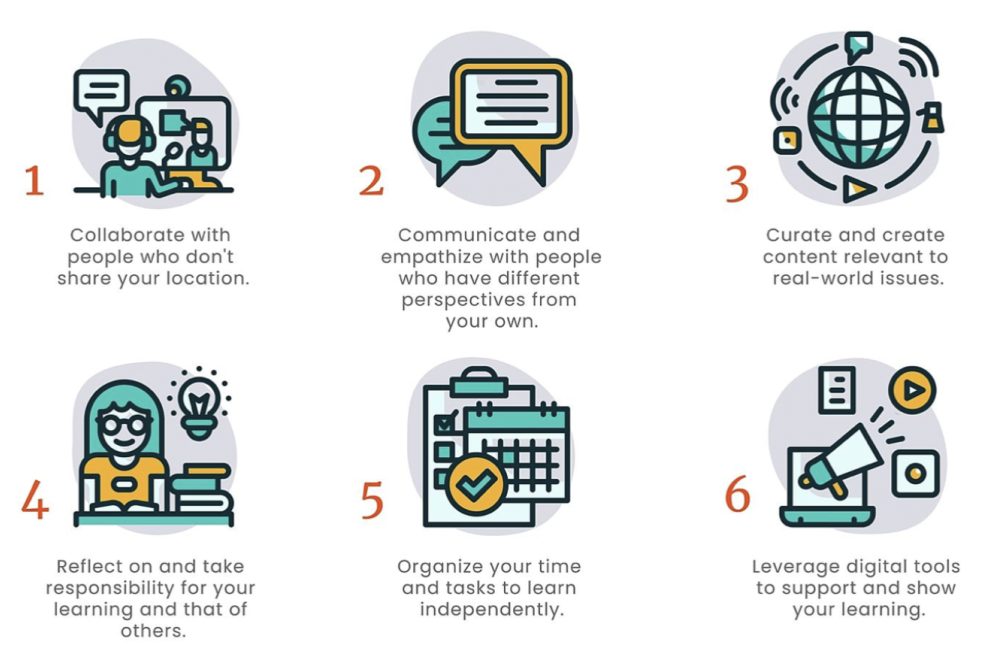
A Compass for Charting the Course Ahead
For intellectually curious high school students like Zosia, Amelie and others, GOA courses expand possibilities for shaping their learning pathways. Students can simultaneously develop specialized expertise and broad skill sets that truly prepare them for the future. GOA's course catalog empowers students to chart their own course - trying on potential majors and careers while also honing their ability to collaborate, communicate, and direct their own learning. While students often go deep down a certain pathway and take a number of clearly related courses, just as often they explore a wider range of interests. Data Visualization is the course after which a student is most likely to take a second GOA (60% of them will), and while the network image below highlights that many of those students will go on to take other Computer Science and STEM courses, it also underlines the fact that just as many will branch out into other disciplines.
Whether your students will use their GOA experience as an opportunity to deepen their expertise in a specific field, or to explore a wider set of possible careers and majors, we are happy to have them charting their course with us.
For more, see:
Why Competency-Based Learning?: A Primer on CBL for Families
Student Spotlight: Preparing Students for College and Career
Student Spotlight: How Students Gain Transferable Skills Through Exploring Their Interests

This post is part of our Student Spotlight series, where we feature stories from students who take GOA courses. Are you a current or former GOA student who would like to be interviewed for a Student Spotlight article? Or, are you an educator who has a recommendation for a student for us to feature? Email us at hello@globalonlineacademy.org with the subject title “Student Spotlight.”
GOA serves students, teachers, and leaders and is comprised of member schools from around the world, including independent, international, charter, and public schools. Learn more about Becoming a Member. Our professional learning opportunities are open to any educator or school team. Follow us on LinkedIn and Twitter. To stay up to date on GOA learning opportunities, sign up for our newsletter.

